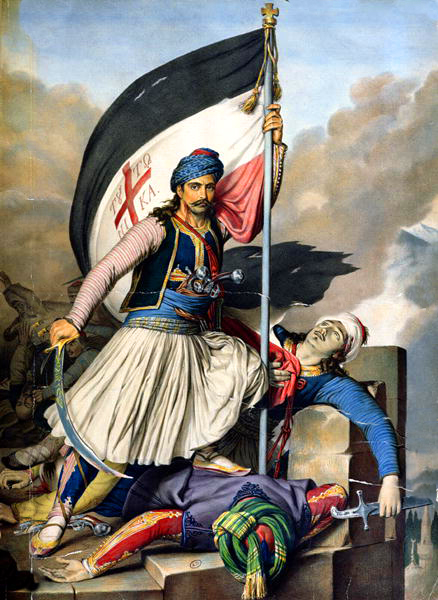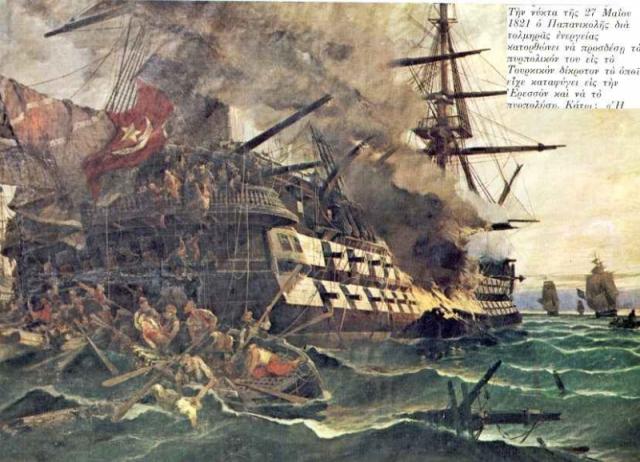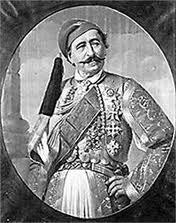Illustrations - Internet
Polina Spartyanova
The strong flame of the April Uprising and its brutal suppression by the Ottomans marked the apex of the Bulgarian national liberation movement. Heroes like apostle Georgi Benkovski and Rayna Knyaginya who sacrificed themselves for the sake of the liberation of their country and compatriots from Ottoman rule are respected along with all the other fighters for the freedom of Bulgaria. However, at times like these, we must remember those heroes who, even before the prominent Bulgarian apostles were born, were able to light the fire of the Bulgarian liberation struggle by taking part in almost all Greek battles for independence, thus contributing towards the liberation of Greece from Ottoman rule.
"Bulgarian generals leading Bulgarian volunteers fought along with Theodoros Kolokotronis, Markos Botsaris, George Karaisakis and other Greek heroes in the sacred struggle for the motherland and freedom. A lot of Bulgarian blood was shed along with the Greek on the battlefields until Turkey that was hitherto considered as an invincible colossus received a death-blow...," Constantine Levidis, the "father of Greek journalism" wrote enthusiastically in 1860 in connection with the self-sacrifice of Bulgarians for the liberation of Greece from Ottoman rule.
 The principles and methods of the revolutionary organization "Filiki Eteria" established in 1814 by the Greeks had consistently influenced the revolutionary efforts of the gradually rising Balkan peoples. Its establishment was followed by the creation of "secret societies" in many Bulgarian towns and villages, which were also involved in the preparation of the uprising, as the greatest researcher of this period of Balkan history, Professor Nikolai Todorov, states in his work "Filiki Eteria and the Bulgarians". According to him, at that time, the Bulgarian population immediately adopted the general liberation sense of the Greek revolutionary action but the differences in the socio-economic, national, and cultural development of the two nations did not allow them to build a pan-Balkan national liberation front. Greek historian Iakovos Michailidis also analyzes the causes for the liberation of Greece nearly 60 years before the liberation of Bulgaria.
The principles and methods of the revolutionary organization "Filiki Eteria" established in 1814 by the Greeks had consistently influenced the revolutionary efforts of the gradually rising Balkan peoples. Its establishment was followed by the creation of "secret societies" in many Bulgarian towns and villages, which were also involved in the preparation of the uprising, as the greatest researcher of this period of Balkan history, Professor Nikolai Todorov, states in his work "Filiki Eteria and the Bulgarians". According to him, at that time, the Bulgarian population immediately adopted the general liberation sense of the Greek revolutionary action but the differences in the socio-economic, national, and cultural development of the two nations did not allow them to build a pan-Balkan national liberation front. Greek historian Iakovos Michailidis also analyzes the causes for the liberation of Greece nearly 60 years before the liberation of Bulgaria.
The revolutionary forces in Wallachia and Moldavia commanded by Alexander Ypsilanti involved 7,000 people, 132 of whom were of Bulgarian nationality. They formed the main contingent of the forces of Eterists in Wallachia and Moldavia, and participated in the movement of Tudor Vladimirescu.
After the complete defeat of the uprising in the Danubian principalities, one of the leaders of "Filiki Eteria", namely Karneadis, sent to Odessa a letter to inform of the failure of Ypsilanti’s uprising, however advising to make the best of this and to undertake a new attempt at rebellion. "Bulgarians, due to their enthusiasm, will welcome the troops with open arms and, fighting together, they will do wonders...," Karneadis persuades in his letter his followers to accept the armed support of the uprising in Greece from the Bulgarian population.

The Greek national liberation uprising brought together the progressive forces in the Balkans, bringing to the fore their common interests, namely to win freedom. Representatives of all Balkan nations fought in the ranks of the freedom fighters from the outset but the number of Bulgarians was the largest. Volunteers from all over Bulgaria set off to the south to take part in the battles against the common enemy, the Ottoman Empire, knowing that, in this way, they would help their own homeland too. The motto of the participants of Bulgarian origin in the Greek uprising was "fight for faith" as they hoped that they would receive the same sympathy and support from their southern neighbour when the Bulgarian population rebelled one day.
The number of Bulgarian participants in the Greek national liberation war exceeded the total number of all other foreign participants put together. A total of 750 people of Bulgarian origin were recorded, not counting the numerous Bulgarian volunteers who remained nameless in the difficult struggle. After September 1821, the ranks of the Greek freedom fighters involved a significant number of Bulgarians who, against their will, had to go to the country together with the Turkish troops, as their assistants, but they sided with the Greeks. Among them, there was a significant number of Pomaks too.
The Greek War of Independence involved Bulgarians from the southern Bulgarian lands who secretly harboured hope for their own freedom. Meanwhile, the Bulgarians who had participated in the battles of Wallachia and Moldavia transferred to Greece too. In the following year, 1822, when the Greeks fought one of the most crucial battles at Dervenaki, the number of Bulgarian participants grew and they were able to inflict a major defeat on the Turkish forces invading from the south. In the coming years, the liberation struggle of Greece continually involved an increasing number of Bulgarians who had arrived in Greece in various ways. A large number of Bulgarian volunteers came from Egypt, where they were in connection with their commercial activities, or as deserters from the armed forces of Mehmed Ali Pasha. They all participated in the battles against the Ottoman forces that took place in different parts of continental Greece, the Peloponnese and Crete. Bulgarian scientist Nikolai Todorov examines the majority of the battles for the liberation of Greece in his book "Balkan dimension of the Greek uprising of 1821. Bulgaria's contribution" and concludes that "every crucial battle in the period 1821-1829 involved Bulgarians".
 It is a little known fact that some of the Bulgarian volunteers became famous for their boldness in dozens of battles and later became generals in both Bulgaria and Greece. The same happened to Hadji Christo, who was one of the most famous Bulgarian participants in the Greek liberation movement. When the Greek rebellion broke out in 1821, the 38-year-old soldier from Vodensko was a member of the forces of Mehmed Ali Pasha of Egypt, en route by sea to stop the Greek insurgents. However, the fearless Bulgarian sided with the Greeks and Theodore Kolokotronis appointed him head of a cavalry of Bulgarians, Greeks and Serbs. Hadji Christo consistently participated in many severe battles, including the Battle of Dervenaki. Along with Kocho the Bulgarian he founded the first Greek irregular cavalry, which later contributed to the liberation of Greece, and became the first head of the Greek cavalry.
It is a little known fact that some of the Bulgarian volunteers became famous for their boldness in dozens of battles and later became generals in both Bulgaria and Greece. The same happened to Hadji Christo, who was one of the most famous Bulgarian participants in the Greek liberation movement. When the Greek rebellion broke out in 1821, the 38-year-old soldier from Vodensko was a member of the forces of Mehmed Ali Pasha of Egypt, en route by sea to stop the Greek insurgents. However, the fearless Bulgarian sided with the Greeks and Theodore Kolokotronis appointed him head of a cavalry of Bulgarians, Greeks and Serbs. Hadji Christo consistently participated in many severe battles, including the Battle of Dervenaki. Along with Kocho the Bulgarian he founded the first Greek irregular cavalry, which later contributed to the liberation of Greece, and became the first head of the Greek cavalry.
For his major contributions to the Greek warfare, he was promoted to the rank of "general" in 1824. Hadji Christo was one of the first men awarded in early 1834 with the highest medal "for the bravery that he showed in all battles and especially in the battle of Dervenaki as a head of a detachment of Bulgarians under his command." After the liberation of Greece Hadji Christo put much effort into the establishment of the new state and in 1843 was elected to the Greek Parliament as a representative of "Thracian-Bulgarians and Serbs".
In 1866 Greek historian Charilaos Dimopoulos wrote about the Bulgarians involved in the Greek liberation struggle, "The Bulgarians who were involved in Filiki Eteria and the Bulgarians who rose at the call of faith and motherland did not lay down their guns and set off to the small country, where the uprising was localized, to fight there against the Turks, and although they have failed to improve the fate of their country, they have praised the Bulgarian name, winning the gratitude of their brothers-in-arms and showing that each enslaved man has the will and the strength to defeat the Ottomans."